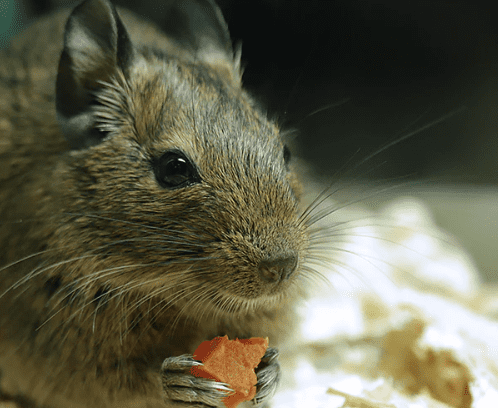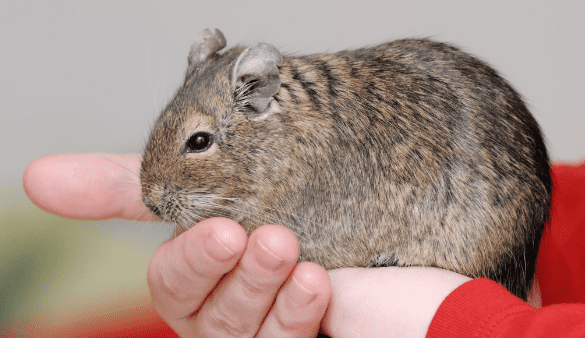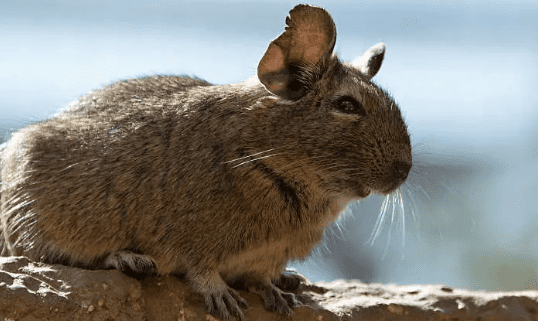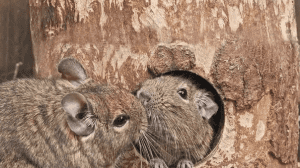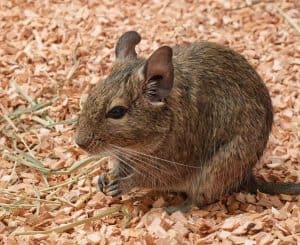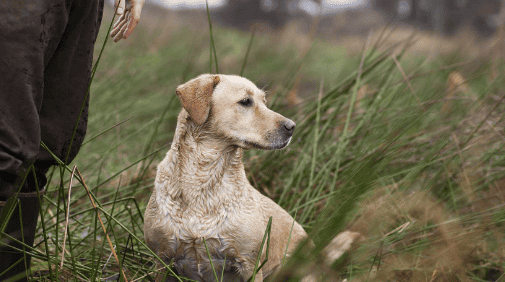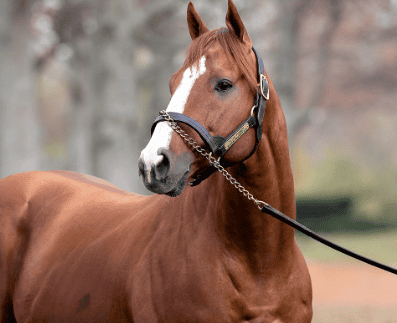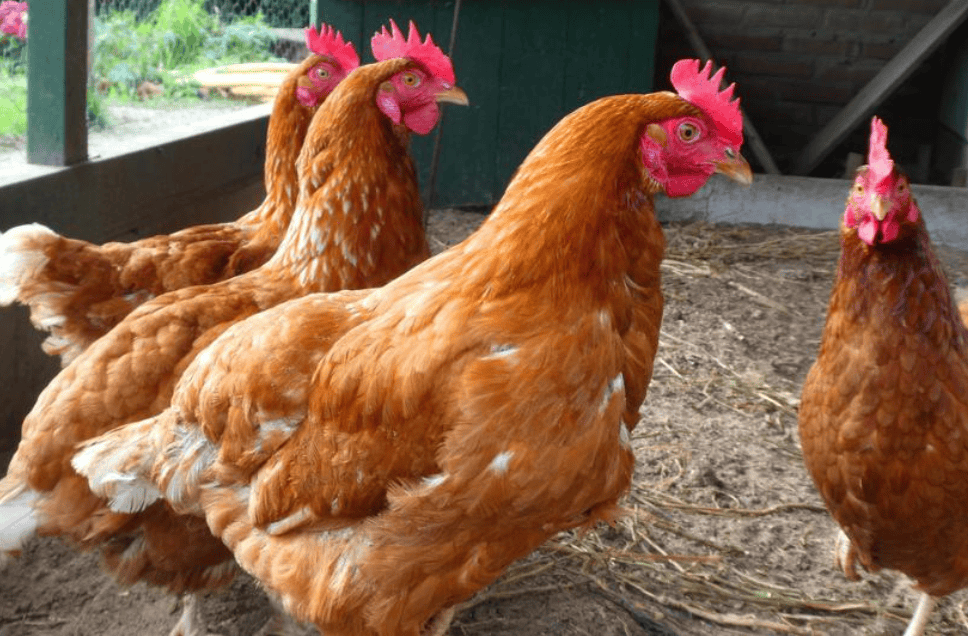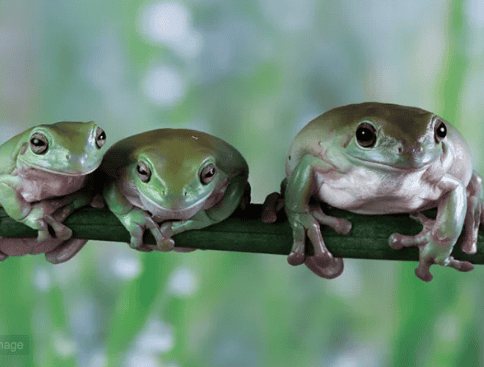Page Contents:
What to Know When Considering a Degu as a Pet
Degus can make great pets, but they demand a significant amount of care and attention.
Here are some important things to keep in mind if you are considering owning a Degu.
- Socialization: Degus are social animals and should be kept in pairs or groups. Make sure you have enough space for at least two degus and provide them with plenty of opportunities to interact and play.
- Diet: Degus are herbivores and require a diet high in fiber. Offer them hay, fresh vegetables, and a small amount of pelleted food every day for proper care.
- Environment: Degus are active animals and like plenty of space to run, climb, and play. Provide them with a large cage or enclosure and make sure that you clean it regularly.
- Temperatures: Degus are sensitive to high temperatures and should be kept in a cool dry place. Avoid exposing them to temperatures above 75°F (24°C).
- Health: Degus are prone to dental problems, so make sure their diet includes plenty of hard foods to help wear down their teeth. They can also develop diabetes, so monitor their diet carefully.
- Handling: Degus can be skittish and easily stressed, so it’s important to handle them gently and calmly. Provide your Degu with plenty of hiding places and toys to make them feel safe and secure.
Are Degus Good Pets?
Degus can make great pets for the right person. They are social animals that are active, curious, and playful. They can form strong bonds with their owners and are known to be quite intelligent.
However, it’s important to note that Degus are not the right pet for everyone. They can be easily stressed if not given proper time to acclimate to a new environment, so they may not be the best pet for young children or for people who are looking for a cuddly, lap pet.
Do Degus Like to Be Held?
Degus can become accustomed to being handled over time, but it’s important to keep in mind that they are not overly cuddly. They are naturally curious and active so they may be more interested in exploring their environment than sitting still in someone’s arms.
When you first start handling a Degu, it’s important to go slowly and let them get used to your presence. Offer them treats and speak to them in a calm, reassuring voice.
You can then start to gently pick them up and hold them close to your chest or in your hands. Keep in mind that they are small animals and can be easily injured if dropped.
Some Degus may enjoy being held for short periods of time, while others may be more skittish and prefer to be left alone. It’s important to respect your Degu’s individual personality and preferences. If your degu does not seem comfortable with being held, you can still interact with them in other ways, such as offering them treats, playing with them, or allowing them to explore their environment while supervised.
Common Degu Lifespan
Degus have an average lifespan of around 6 to 8 years, but with proper care and a healthy diet, they can live up to 10 years or more.
The lifespan of a Degu can vary depending on factors such as genetics, diet, environment, and overall health. It’s important to provide your Degu with a spacious and clean living environment, a balanced diet, and regular veterinary check-ups to help ensure they live a long and healthy life.
Degu Vs. Chinchilla
Degus and chinchillas are both small rodents that are popular as pets, but there are some differences between the two species.
These include the following:
Appearance: Degus are smaller than chinchillas, with a body length of around 5-6 inches (12-15 cm), while chinchillas are around 9-15 inches (23-38 cm) long. Degus have short fur that is usually brown or gray, while chinchillas have dense, soft fur that is typically gray or white.
Social behavior: Both Degus and chinchillas are social animals, but they have different social patterns. Degus are typically kept in pairs or small groups, while chinchillas are often kept in pairs or larger groups.
Diet: Degus and chinchillas have similar dietary requirements with minor differences. Degus demand a high-fiber diet that includes hay, fresh vegetables, and a small amount of pelleted food. Chinchillas also require a high-fiber diet, but they are more prone to digestive issues, so their diet should be carefully monitored and they may require more specialized meals.
Temperament: Both degus and chinchillas can be active and playful, but they have different personalities. Degus are known to be curious and active, while chinchillas are often more shy and timid.
Lifespan: Degus have an average lifespan of around 6 to 8 years, while chinchillas can live up to 15 to 20 years with proper care.
You can reference the below table for a quick summary of the differences between these two species:
Degus
- Short brown or gray fur, 5 – 6 inches in length
- Live in pairs or small groups
- Eat hay, vegetables, pelleted food
- Curious & active
- Typically live 6 – 18 years
Chinchillas
- dense white/gray fur, 9 – 15 inches in length
- Tend to live in larger groups
- Require more specialized food
- Can be shy at first
- Typically live 15 – 20 years
Price of a Degu
The cost of a degu can vary depending on several factors, including where you live, where you purchase the Degu from, and whether you adopt or buy from a breeder.
The total cost of adopting a Degu can be anywhere from $100 – $300.
This can be broken down by the following:
Adoption fees: If you choose to adopt a degu from a shelter or rescue organization, the adoption fee can range from $10 to $50.
Initial setup costs: You will also need to purchase an appropriate cage, bedding, food, and other supplies, which can cost around $100 to $200 depending on the size and quality of the items.
Ongoing costs: You will also need to factor in ongoing costs such as food, bedding, toys, and veterinary care, which can add up over time.
It’s important to note that the cost of a Degu is just one factor to consider when deciding whether to bring one into your home. You should also consider whether you have the time, space, and resources to provide proper care for a Degu throughout their lifespan.
Are Degus Legal in the U.S.
Yes, Degus are legal to keep as pets in most states in the U.S., but there are a few exceptions.
California and Georgia both have restrictions on owning Degus. In California, Degus are considered a restricted species and can only be kept with a permit from the California Department of Fish and Wildlife.
In Georgia, Degus are classified as wild animals and cannot be kept as pets.
It’s important to note that while Degus may be legal in your state, there may be local regulations or restrictions on keeping exotic pets. It’s always a good idea to check with your local government or animal control agency to make sure you are following all applicable laws and regulations.
Additionally, it’s important to ensure that any degus you purchase or adopt come from reputable sources and are not illegally captured or sold.
